
We have marched, protested, protected, participated, invested, and been students as well as teachers within various forms of free education. From cultural centers to universities, Capoeira schools and edible forests, online classes, and even defending rehabilitated squatted land that had educational programs run by the people for the people. In particular we have defended access to the arts, dance, folklore, human heritage. And none of that can exist without nature, so we protect nature through supporting ecological and sustainable agroecological education in all its forms.
Why defend the arts & ecology?
The arts and ecology tend to be neglected in favour of academic subjects. This, despite how complimentary they can be to help learn academic subjects, and how profound the impact of access to the arts and nature is to improving quality of life for all sectors in society. For the more vulnerable, we have seen how arts can help increase confidence to learn to read and write (Click here to see the project in Mendoza with illiterate woman); how using art to teach about the environment gets kids involved in its healing; how dance classes can improve health, combat anxiety and depression, and help people to bond with others to create a support network.
What is a free inclusive education?
Lets break it down...
Free education... There is no cost to the student to participate, i.e.: entry; taking exams; access to lessons, places to study, events, equipment or books.
Inclusive... When there is no cost for the student, education is inclusive as it doesn't exclude those who can't afford it. This creates diversity within the place of education, which, in turn, enables more tolerance and compassion with divergent sectors of a society.
Accessible... Location and access are also important. If people can't get to where the education is held, they are left out and are potentially at a disadvantage. The complexity of enrollment can be a barrier also: assembling the required documents, certificates etc; entry exams; transport; language. Class times can be a barrier too if there isn't flexibility for those that need to work or have children. Argentina's universities offer the same class several times a week to accommodate for all students. Furthermore, you can choose the order of the subjects you wish to study in your degree, and have various opportunities to pass the term exams.
Drop-in cultural centers and going to vulnerable areas without cultural centers or schools are vital for those in the most neglected sectors within a country. They can benefit enormously - it can be a bridge to end poverty and cycles of violence. Joseph Chilton Pearce explains in his research how it takes one inspiring mentor for a child to break a vicious cycle.
[Find video of guide through velatropa]
Funding... Funding is helpful to maintain continuity: salaries for teachers and organizers so they're able dedicate more time; grants for projects and students, housing, sponsorship, investment etc. However, I have seen that funding isn't the be all end all for something to exist - it is not the only currency of support. Many people volunteer their time, skills, land, equipment etc. We have seen derelict land squatted in order to rehabilitate it, creating a hub with the local community's skills; online support groups and other such like projects can be conducted without funding. In fact, sometimes projects can have benefits from not being privatized and made into a business. In university education, for example, students not carrying the cost of their education are more assured to not end up with a lifetime's worth of debt upon completing their studies. See this documentary to see what private universities cause their students to go through.
Lastly I think it is important to clarify what I mean by an EDUCATION. I believe there are two ways to understand an education:
1 the process of receiving or giving systematic instruction, especially at a school or university: a course of education. • the theory and practice of teaching: colleges of education. • [count noun] a body of knowledge acquired while being educated: his education is encyclopedic and eclectic. • information about or training in a particular subject: health education.
And secondly:
2 (an education) an enlightening experience: Petrus is a good workman—it is an education to watch him.
I feel the latter gives an indication of the potential of what an education can be, and the manner in which it might manifest and take shape.
I don't reckon an education is limited to the classroom. In fact, I believe it is limited by a classroom in many cases. As a member of the Self-Directed Education Alliance, aka SDE, I advocate Peter Grey's definition of education...
"...The sum of everything a person learns that enables that person to live a satisfying and meaningful life..."
Feel free to watch the video [linked here] that gives a small introduction to what the SDE Alliance is. Many of our workshops have used the fundamentals of SDE, as well as play theory.

Thanks to the education in our folklore degree in Buenos Aires, we have been gifted the tools to better observe & appreciate the sacredness of human heritage. We learn how valuable a person's life experiences can be to keep alive wisdom and knowledge, which help us orientate ourselves as a species. Furthermore, we understand what it means to our species to be able to pass that ancestry on. Due to the ephemeral nature of some forms of folklore, which can die with a person, it can be endangered without due appreciation and credence as a necessary education. In this journey we have come to find remarkable ways & places of educating and being educated, that truly are an enlightening experience. Below I go through examples of how we have supported not just financially but through using our skills with artists' communities, remarkable projects and people making a difference in the world.

How does The Loving Collaborative defend free education?
We defend it in various ways:
Media, marches & protests to protect funding We have marched; supported street art interventions; organised petitions; participated in student unions; joined a student take over of our university; and tried to always emphasize the importance of free inclusive arts & ecology education whenever we get heard, or have media coverage.
Volunteering in vulnerable, neglected areas We take talented people to create workshops in the places they wouldn't usually go. We enable community leaders to organise what their community needs; & we support ongoing projects.
Free classes, events & workshops Teaching free or donation-based classes/workshops; holding events funded by grants; offering free online workshops.
Protecting Human Heritage Learning & passing on cultural heritage through travel; classes; participation in cultural events; participation in ceremonies; documenting; and supporting those keeping human heritage alive.
Support through Participation We continually enroll to free education in cultural centers. We are also enrolled to study a folklore degree & degree in Body Expression at the University of the Arts, Buenos Aires (La UNA). We participate in open culture events with free access for all; and support those enabling such things to happen.
Where have we defended and participated in free inclusive education?
I have selected a few examples from the last decade of the kinds of projects and places we have been involved with. I hope that this offers real life examples of our methodology, and therefore context, to what I have written.
Supporting public universities in Buenos Aires
La Cuidad Universiatia Drew was asked to give a lecture about creativity, showing his artwork to the students of Design & Architecture. We spoke about how we create and get inspired; as well as our art projects in poorer areas, and their impact and solutions they provided.
La Univesidad de las Artes Buenos Aires; We enrolled to two degrees: Folklore, with a specialty in Tango; & Expresión Corporal. We have defended the university with students & teachers in a university take over and in marches to protect funding; supported financially challenged students; and taken part in 'ollas populares'.
The video above is a choreography performed by students at our university. The lyrics have been adapted to explain the need for free university arts education ***[Lyrics]
Volunteering
Villa Fiorito We started by volunteering with a group called Movimiento Evita that was running a cultural center in the shanty town of Fiorito (incidently, where Maradona grew up). They give under-privileged children and adults the chance to learn instruments, dance, to read and write; they organise community rallies; support the cultural heritage of Murga; and helped organize a live music event. We then became friends with the community and organised informal events with volunteers to help with art projects, dance classes, and supporting those doing good in their community.
We helped with a charity called Ellos Tendrán Futuro, who support families to become self-sufficient.
Orginsed fundraising events
Outings with kids
Bonded with community playing football, doing murals together, cooking together etc
Found talented contributors to work for charity.
Mendoza We volunteered with a group that went to an isolated rural area to teach illiterate women their human rights. We designed an art project to help with their confidence.
Youth Group We helped a community leader with a youth group that was painting a mural.
Supporting Human Heritage:
Volunteering in Centro Cultural el Borda
Drew sung in various of their monthly festivals
We donated an art piece
Invested in art at an exhibition of EL Borda patients
Participated weekly with projects and tasks
Donated clothes, kitchenware, electronics etc to the center.
Raised awareness through taking people to get to know it.
Supporting free access cultural events in Buenos Aires
From free entry Milongas (Tango venues), to open access cultural events in cultural centers such as Centro Cultural Recoleta, Centro Cultural Kishner, Centro Cultural el Borda and countless others, Buenos Aires is a cultural hub, and despite being a 'developing country', boasts thousands of events every year that are free, inclusive for all - all ages, and all nationalities.
Seen above: Drew singing in the university choir for the Folklore Festival held yearly at the university; drawing outside a San Telmo gallery for 'La Noche de los Museos'; and taking Granny to the Milonga dedicated to 'Las Abuelas' - She loved it.

Showing support through art by, for example, dedicating & donated a drawing of La Milonga de Plaza Dorrego, aka 'La Milonga de las Abuelas', organized by el Indio (seen in the photo on the left, and in the drawing on the far left too). El Indio has kept the Milonga and Argentine culture alive through many adversities. Drew donated the large art piece to the Milonga & he has given it to his family.
Drew has also drawn many ground-breaking dancers to support their part in the Tango movement. For, example Juampy Ramirez, who has revolutionized the freedom of gender roles within Tango, along with others. Drew also gifted portraits to friends made through tango.
Defending human heritage by attending a protest about Protecting Milongas that were being shut down by the government of Macri. Tango culture was being censored. We danced on the street with hundreds to defend our right to Tango and for it to be protected.
Supporting gender neutrality in Tango
Attending Inclusive gender role-friendly Milongas, and yes we take the baby too :)
Creating a performance with Juampy Ramirez, Oriel Toledo and others that experimented with mixing gender roles in the arts.
Supporting those enabling gender neutrality
Always teaching both roles in our Tango classes
Hosted Milongas in Omeara, London to promote inclusive Tango environments: promoting no gender roles in dancing; teaching both roles in the class; all ages welcomed and accommodated for; music collaborations; and teaching about the African & indigenous heritage of Tango that has been neglected. A special thanks to Ben Lovett for hosting us at Omeara, and playing with his old friend; and to Martin from Tango Terra for coorganising the event.
We supported a Capoeira school in Bahia, Brazil, which teaches the kids in Bahia their heritage; and supported them with school work.
Participated in classes, helped to teach English
Helped clear new space they moved into
Drew their sign, with the motivational message they requested - to never give up.
Went to Capoeira event in the founding school of Capoeira in Brazil.
Supported Marine Rescue Center Projecto Tamar
Helped to look after rescued turtles
Designed and painted a mural
Went on litter-collecting adventures in the village with kids
Ran workshop on upcycling collected litter
Enabled a child-run impromtu theatre company
Bonded with community through participating in cultrual events
Drew drew many members of the community
Supporting Birthing
Ran a workshop for free for the midwives of the center of Parto Humanizado. We then translated it and converted it into an audio for pregnant couples to do at home during lockdown. Link here.
Supporting sustainable agro-ecological practices
We have participated in many courses & events, for example:
Earthship, who teach how to make homes off-grid
Mingas (the practice of a community coming together to help someone build their home)
Sumando Energias Learning to build solar water heater from waste
Suporting a remarkable project called the Viccu
Volunteered with maintanence of the edible garden and cultural center
We organised & taught a Tango classes with Oscar, the street dancer
Raised funding to install a permanent dance floor on the premises
Raised awareness of the place and project's existence through media and tours from Airbnb
Enrolled in classes of plant medicine, gardening, solar energy
Participated in their social events and festivals
If you wish to see more detail, or more projects we have been involved with, please have a browse through our blog...








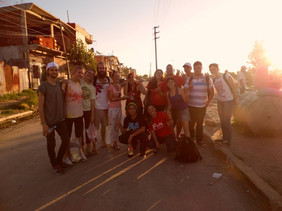











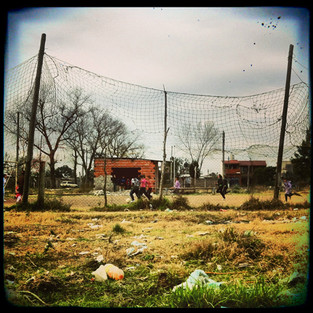



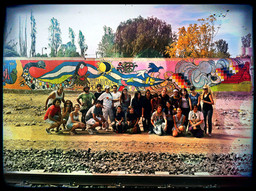



















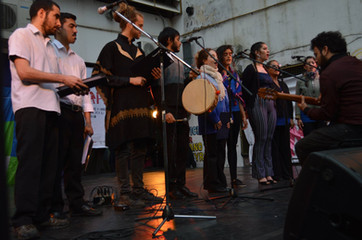

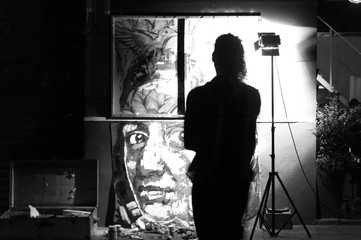

















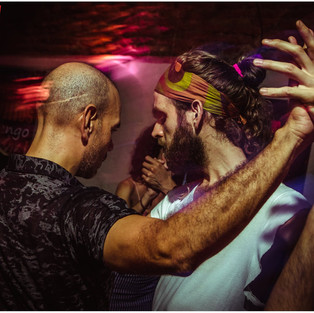









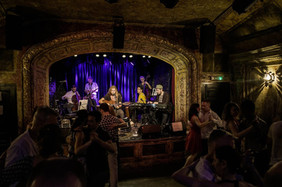

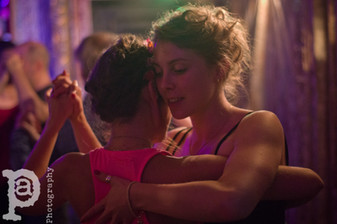









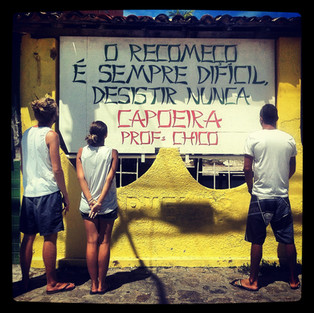



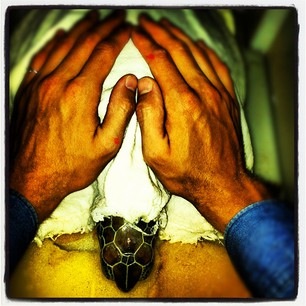

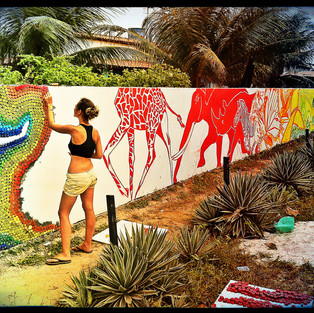


























Comentarios